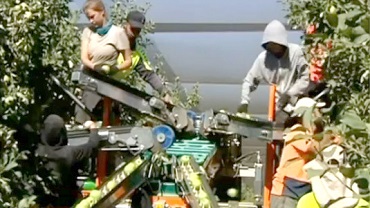By Louise Ackland, Co-owner and Operator of Payne’s Farm Contracting. While the views expressed in this article are not all necessarily those of the Citizens Party, it provides an important firsthand perspective on an issue of national urgency.

Hard-working Australian farmers have been calling for years now for an overhaul of the visa system for working holiday makers and the introduction of a specific Ag visa. All over the country at the moment there are increasing stories of farmers having to plough crops back in or having to leave valuable produce unpicked due to labour shortages.
Consumers can expect up to a 25 per cent increase in the cost of fresh produce as this crisis plays out.
In the meantime Victoria’s Premier Dan Andrews has positively tripped over himself to get tennis players in to Victoria, while delaying a response to all calls for essential workers.
Figures from Tennis Australia show last year’s Australian Open contributed $387.7 million to Victoria’s economy, and created 1, 775 full-time equivalent jobs. Victoria’s horticulture industry, by contrast, is worth $3.1 billion in produce annually plus another $5.4 billion from processing, making it the biggest horticulture producer in Australia.1
Meanwhile the unions are circling to pick at the carcass of this industry with the introduction of the newly formed Retail Supply Chain Alliance which will be the new “farming police” that will require intrusive oversight of the whole supply chain of Australian produce from farm to supermarket shelves. While they salivate at the prospect of this level of power and new membership, Industrial Relations Minister Christian Porter and the Fair Work Commission (FWC) begin to consider changes to the Horticulture Award, which may bring an end to the provision of Piece Rate payments and ensure that all workers earn the base hourly rate of $24.80 regardless of their productivity, skill or motivation.
“That sounds fair enough”, you might think, “after all aren’t all horticulture workers being ripped off and exploited?”
Well, that’s the narrative that the unions have very successfully established; however, carefully consider their motivations for peddling this trope—the power they will have to disrupt the harvest and distribution of food throughout the country and the consequent power that will afford them.
How did we get here?
The topic of farm labour was of little interest to the Australian public until then-Treasurer Joe Hockey introduced changes to the Backpacker Tax into parliament in 2015, which caused a flood of objections and opinion. As ALP agricultural spokesman Joel Fitzgibbon stated at the time, after four attempts and with a “special kind of genius” the government settled on taxing backpackers at a rate of 15 per cent on their first $37,000 (the original proposal was for 32.5 per cent). So those farm workers don’t get the benefit of the ($18, 200) tax-free threshold in the same way an Australian worker would. But wait, it gets better! To retain some of the projected revenue this genius piece of policy promised, they tax departing backpackers a whopping 65 per cent on any superannuation they’ve earned while in the country. Just a tax on farmers and employers then, wouldn’t you say?

Couple this with a relatively low hourly rate (because agriculture is so undervalued by Australians), the high cost of getting here from Europe where most of the workers on 417 visas come from, the cost of living, and the arduous nature of the work in our extreme climate, the poor struggling backpacker is being slapped from every direction. So, let’s get this clear—the largest, the most systematic and the most orchestrated campaign of “wage theft” and exploitation of backpackers is perpetrated by the Australian government. And to give Joel Fitzgibbon his due, he predicted everything that has transpired.2
As a consequence of these cost pressures there is a strong incentive for those involved to negotiate other arrangements, such as cash payments where everyone is better off. It may also have contributed to the huge demand for Australian Business Numbers (ABN) in 2017 (which is when the backpacker tax was starting to take effect); 180,000 ABNs were issued to people on tourist visas who aren’t allowed to have one!3
The tool of choice for dodgy employers to exploit workers is visa restrictions. Sitting behind this is a dark world of exploitation and modern-day slavery carried out by contractors and “middle men” who’ve done a much better job of supplying the labour needed than legitimate operators. This system brings with it people-smuggling, illegal practices such as money laundering and political infiltration.4 For more on this have a look at the Black Economy Taskforce Report.
The Pacific solution

Farmers’ groups have been lobbying hard to open our borders to our near neighbours to get the Pacific Worker Program back in swing and for those farmers who can afford it, this is a desirable option. Most of these countries are virtually virus free after all. As usual, however, there are the costs and logistics involved in order to quarantine workers at various points along the way. Just as with tennis players it’s a pretty hard sell to all of those stranded oversees and desperate to get home.
For small farmers, however, the Pacific Worker Program is an expensive lottery and many are suspicious of the government’s dedication to this option. Some of us might wonder if the provision of much-needed labour is secondary to geopolitical considerations: the foreign aid the program supplies; the stabilising of relations with these countries in order to shore up detention centres; prevention of Chinese expansion and possible military bases being built; and assuaging Pacific leaders’ claims that their countries are sinking as a consequence of climate change, or penance for corrupt treaty negotiations such as the scandal around Timor-Leste. (Watch Juice Media’s Honest Government Ad: Visit Timor-Leste for an amusing version of those events.) Why are Australian farmers expected to bear the cost of these issues?
But shouldn’t we be using Australians?
As much as it will offend many to hear this, Australians are not favoured by farmers due to their unreliability and their aversion to hard physical labour. Just 253 Australians have signed up to take advantage of $6,000 worth of incentives and assistance to take up regional farm work, as well as Centrelink concessions that allow them to earn and retain Jobseeker payments at the same time.
Yeah, but the pay is not good enough!
No one seriously suggests that all farm work is well paid. However, farmers have not done a very good job of defending how piece rate works. It’s straightforward—you get paid for as many bins/lugs/boxes of fruit/produce you pick/ harvest. The harder you work, the more you earn. Most of us are not born fruit pickers so there is every chance we’re not going to earn much until we get far more experience. Many suggest that everyone should be able to make the same amount as being paid on wages—this is not the case. Interestingly, many recent stories covered by mainstream media outlets which detailed examples of workers not being paid enough coincided with the union’s submission to the National Agricultural Labour Advisory Committee which demands that government discontinue the Working Holiday Maker program in its current form and deepen the scope of Seasonal Worker Program (SWP).5
How do we fix it?
The most urgent priority is to retain as many backpackers in the country as we’re able to. Similar to the requirements for completing 88 days of work in regional areas, the dwindling number of backpackers still here could be offered the opportunity to extend their visas again if they take up work in agriculture.
The Horticulture Industry Labour Agreement became available early last year and thus far has had very little success—possibly due to its poor promotion and lack of support to navigate the burdensome qualifying process. Not to mention the cost and the levy added at the end, of thousands of dollars, to go towards the Skilling Australia Fund (another piece of special genius—this time Peter Dutton’s), but that’s a story for another day.
The Government could assist enormously if they worked with farmers to open this pathway and reward those workers whom individual employers would like to invest in and retain. One of the most value-sapping features of the current labour supply model is the drain of high turnover of staff, the cost and lack of productivity of constantly starting with new workers every day/week/shift. This turnover also leads to increased likelihood of injuries and many of the stories of so-called exploitation as workers find that in their first few weeks they struggle to make much money. It creates a culture of frustration and disappointment on both sides that is pitting worker against employer and providing the perfect breeding ground for division and resentment.
Accommodation options are crucial in many regional areas. In Victoria, farmers are prevented from providing housing on-farm, which means that workers have to rely on hostels or worse still, set themselves up in dangerous “share house” arrangements. Further exacerbating this issue is the lack of public transport to the areas where the farms are and so the cycle continues. Instead of preventing farmers offering accommodation, why not work with them to enable this option. In many rural areas the problem of zoning is preventing investment in accommodation.
Dodgy contractors! The various Labour Hire Licensing schemes ostensibly introduced to squash this issue have had absolutely no effect. In fact, during 2020 the Victorian Labour Hire Licencing Authority announced that it wouldn’t be doing any physical enforcement operations “due to COVID-19”. You can imagine the field day conditions created as a result. One of Victoria’s largest horticulture areas surrounds the town of Mildura, yet the nearest office of Fair Work is 400 km away in Bendigo! Get the enforcement teams up to this area for as long as needed to get this sorted out! Under the present conditions the only operators who have a reliable supply of workers are those who had illegals all along.
Work with farmers to address their needs instead of imposing regulation over the top of them.
A final word
Farming is not the only sector experiencing labour and skill shortages at the moment, and it is certainly not the only sector where worker exploitation, wage theft or mistreatment occur. The retail, maritime, hospitality, beauty, transport, cleaning, security, aged care, sex, abattoir and warehousing industries are also areas which have a heavy reliance on overseas workers and where allegations of this kind of culture are rife. Why are farmers singled out? So while we all battle to keep our businesses and farms in operation and get food to the Australian consumers—let the hunger games begin….
Editor’s note: Like the problems in so many other areas of the economy, Louise’s article demonstrates the need for the Federal and State governments to proactively intervene to solve the urgent problem of farm labour shortages, instead of their usual approach of twiddling with the “settings” so the “market” and “stakeholders” solve the problem. The Citizens Party supports a long-term solution in which agricultural industries are properly valued and there is adequate investment in the hard and soft infrastructure regional communities need to thrive and maintain a more permanent workforce, but in the meantime immediate remedies must be introduced.
Footnotes
1. “Australian Open: $8.5 billion in fruit and veg ignored as tennis stars arrive in Melbourne”, The Weekly Times, 18 Jan. 2021.
2. Joel Fitzgibbon, 2nd Reading Debate, Superannuation (Departing Australia Superannuation Payments Tax) Amendment Bill (No. 2) 2016, Hansard, 1 Dec. 2016.
3. “ATO to Audit 20 Million Visa Holders through Data Matching with Immigration”, 1 June 2018.
4. Black Economy Taskforce Final Report, October 2017.
5. Retail Supply Chain Alliance: Submission to the National Agricultural Labour Advisory Committee, 3 August 2020.






